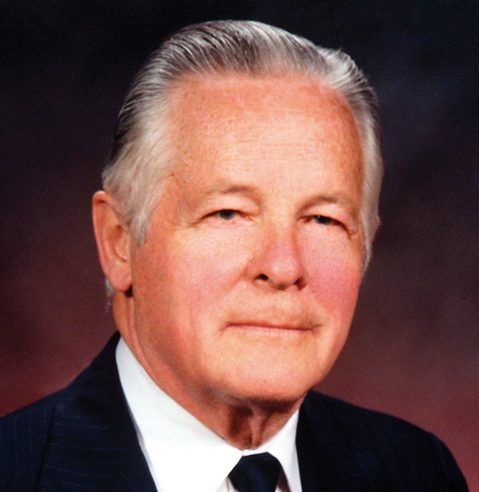Howard Sumner Holmes
Former PresidentHoward Sumner Holmes and his twin brother Dudley grew up around the mill. During his school years Howard's academic and athletic achievements were impressive. He was captain of the football team both junior and senior year, and played basketball all four years of high school. In addition to his athletic prowess, he was an accomplished orator, actor, journalist, and class leader. Howard was editor-in-chief of the yearbook his senior year, class president his sophomore and junior years, and an award-winning orator of his graduating class. All were signs of things to come.
On October 29th, 1936, the twin's father, Howard Samuel Holmes passed away in an unfortunate accident. The brothers, now 23 years old, recognized the importance of keeping the mill running in the wake of tragedy. Howard's death propelled his wife, Mabel, into the presidency of the company, with Howard and Dudley taking on administrative roles. Howard had transferred from Princeton to University of Michigan in order to study engineering. In the midst of his college years, Howard decided to take time off from school to work on developing a hydrogen engine, which would run on water. Afterward, he returned to the university to finish his degree.
"Howard hadn't planned on coming to the mill after graduation," his wife recalled. "He had accepted a job with an engineering firm in Chicago, but when his father died, he decided that his place was at the mill." Howard supervised sales and administration and relied on his engineering background to oversee the maintenance and design of the equipment.
As often as he could, Howard would go on the road, trying to introduce the "JIFFY" business to other markets in the Midwest and Pennsylvania. Many weeks, Howard would be gone all week while Dudley supervised the mill; then the brothers would work together in the mill all weekend. Often Howard would arrive as early as three in the morning. "The mill became his life.", said Lynwood Noah, Howard's childhood friend.
In 1946, with Howard at the helm, it was decided that Chelsea Milling would eschew traditional means of advertising, focusing instead on making the best product at the best price. To be sure that the savings were passed along to the consumer, Howard decided to have the shockingly low price printed on the box. From there, the company's growth was gradual but steady, taking around fifteen years for "JIFFY" mixes to become available nationally.
In the early 50s, the plant had 10 lines of packaging machinery installed, and roller conveyors now replaced forklift skids in the warehouse. Howard's warehousing approach was unique in the whole milling industry. Chelsea Milling Company was the first in the nation to have a practical application for computer-controlled warehousing. Chelsea Milling Company was the first in the world to have a complete conveyance system, which initially was more than twenty miles in combined length. Businessmen and engineers from around the world flew into Detroit, then drove to rural Chelsea to see the extraordinary system in operation.
Through the 1950s and 60s there was steady growth at the plant as massive new 1-million-bushel grain silos rose in Chelsea, as well as a new 3,000-square-foot wheat flour mill. Through these two upgrades, the company's total package output capabilities tripled.
During his career, Howard also worked to improve wheat crops; initiating the Wheat Improvement Program at Michigan State University, as well as lobbying to help Midwest soft-wheat farmers.
"He was fair and honest, and if he told you something, you could take it to the bank. His word was his bond. He thought of his employees' welfare and feelings as much as he thought of his own.", said mill employee N.H. Miles. "I've worked in several different places, but Howard Holmes was the best manager I ever worked for."


